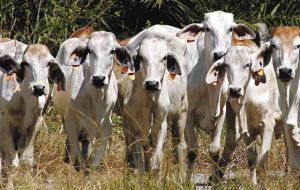MercoPress. South Atlantic News Agency
Chile becomes the sixth country to ban Brazilian beef because of atypical BSE
 Brazil exported 62.000 tons of beef to Chile in eleven months of 2012
Brazil exported 62.000 tons of beef to Chile in eleven months of 2012 Chile joined five other countries that have banned imports of Brazilian beef, since a case of atypical mad cow disease was confirmed last month, Brazil's foreign trade secretary Tatiana Prazeres said on Wednesday.
Brazil, the world's leading beef exporter insists its beef is safe and announced it is considering retaliation at the World Trade Organization (WTO) if the countries do not lift the bans, Prazeres told reporters in Brasilia.
“There is no basis for these decisions on health parameters and the government is analyzing what measures will be taken,” she said. “Taking action at the WTO is on our radar.”
China, Japan, South Africa, Saudi Arabia, Jordan and Chile have informed Brazil about their export bans since the World Animal Health Organization (OIE) said a cow that died in 2010 had atypical bovine spongiform encephalopathy (BSE), she said.
Chile imported 62.600 tons of beef from Brazil between January and November 2012, according to the agriculture ministry. It imports the most beef among the countries that have banned Brazilian beef.
Prazeres estimated that 4.4% of the country's total beef exports have been affected by the bans. Even with the measures, however, beef exports rose to 83.700 tons in December compared with 82.700 in November and 63.100 a year earlier according to trade ministry data released on Wednesday.
The 13-year-old grass-fed cow, which had been kept for breeding in the state of Parana, never developed BSE, commonly known as mad cow disease, but it tested positive for the prion protein that causes the disease.
The Paris-based OIE, which confirmed the atypical BSE diagnosis, has maintained Brazil's status as a beef producer with negligible risk of mad cow disease.
Officials from the Secretary for Animal and Plant Health at Brazil's farm ministry said on Dec. 21 that Brazil would give the countries that curbed its beef imports until March before pursuing legal action at the WTO.
Brazil launched a diplomatic offensive to distinguish “atypical BSE,” which is caused by a random genetic mutation more common in elderly cattle, from BSE cases in the 1980s and 1990s in Britain and elsewhere in Europe that were caused by contaminated animal feed.




Top Comments
Disclaimer & comment rules-

-

-

Read all commentsAnd thanks to Nestor,the Argentine beef industry was neutered and can not step back in to the world market. Uruguay will benefit...
Jan 03rd, 2013 - 10:09 am 0Would the WTO concern themselfs with something that is clearly a health issue.
Jan 03rd, 2013 - 12:57 pm 0Surely individual states can legitimately ban import of goods on those grounds?
RC
Jan 03rd, 2013 - 01:20 pm 0Quite right.
It is shear arrogance on the part of Brazil to threaten action at the WTO. Chile has no ulterior motive in banning Brazilian beef. We have to import beef and Brazil is one of the least expensive options.
Commenting for this story is now closed.
If you have a Facebook account, become a fan and comment on our Facebook Page!